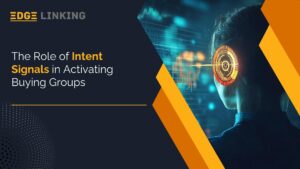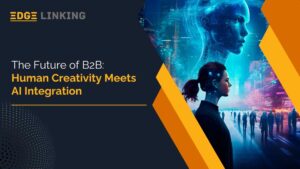Let’s be honest: most of us use artificial intelligence more than we notice. It’s just woven into our everyday lives now. And B2B marketing? It’s definitely in the mix.
AI has quietly but significantly transformed the B2B scene. It’s a powerful force that operates behind the curtain, making substantial changes without much fanfare. Its transformative power is inspiring, and it’s time we start discussing it more.
We all know the B2B buyer journey can feel overwhelming, like a never-ending road trip. It’s a hurdle for marketers, sales folks, and buyers alike. But here’s the good news: AI is here to help. It’s a hidden advantage that can boost that 2% conversion rate into something much more significant, providing relief and hope for a smoother journey.
But this is where artificial intelligence steps in. Many clever B2B companies have figured it out – AI is their hidden advantage in boosting that 2% into something much more significant. Some B2B success stories are even reaching conversion rates close to 12%. And it’s not magic; it’s AI taking on the tough work.
Slowly but surely, B2B businesses are embracing the evolving landscape of AI in marketing. They’re incorporating it into their websites and strategies, and if you’re not using AI in your demand generation efforts yet, it’s time to catch up and be part of this dynamic evolution.
But don’t worry if you haven’t ventured into AI yet – there’s still a chance. We understand that it can seem like a daunting task.
There’s no need to stress; we’re here to help. We’ll break everything down so you can relax and let AI work its magic: providing a personalized, smooth experience for your leads and customers while improving conversion rates and ROI.
Let’s dive into the exciting part.
What Is AI-Enhanced Demand Generation?
Simply put, AI-driven demand generation means using artificial intelligence to amp up how you create interest in your products or services. It’s like adding a turbocharger to your marketing approach with the help of machine learning and data analysis.
Here’s how it works:
- Getting Inside Consumer Minds:
AI analyzes a lot of information to discover what your customers enjoy, what interests them, and when they might want to make a purchase. It also looks at how they act, what they prefer, and their routines, helping you get to know them better.
- Forecasting the Future (Kind of):
Thanks to big data, AI can help you predict market trends and understand what your customers might want in the future. It’s similar to a crystal ball for businesses but much more precise and supported by real data.
- Making Marketing Super Personal:
The era of generic marketing is over. With the help of AI, you can create content, ads, and messages that connect specifically with your audience’s desires. This personalized approach really makes a difference in increasing engagement and driving conversions.
- Optimizing On the Fly:
AI isn’t a one-and-done solution for your marketing strategy. It constantly adjusts and improves your methods in real time, ensuring you always use the best ways to connect with and convert customers.
How is AI Changing Demand Generation?
AI is transforming demand generation in ways we never thought possible. Here’s a look at how AI is changing the way businesses attract and engage customers:
- Personalized Marketing
The era of one-size-fits-all marketing is over. AI analyzes customer information in real time to create tailored content that speaks to each person. Whether suggesting products, crafting unique emails, or personalizing website visits, AI makes every interaction feel special and relevant. This leads to better engagement and improved conversion rates.
- Anticipating Customer Needs
Thanks to AI, businesses can predict what customers might do next. By looking at past behavior, AI can predict which products a person may like or when they might buy. This ability helps businesses act quickly and connect with leads when they’re most likely to convert.
- Adapting on the Fly
AI doesn’t just help with planning; it also helps with real-time changes. As marketing campaigns are implemented, AI keeps track of how things are going and adjusts. If something isn’t performing as planned, AI can modify the approach immediately, ensuring that efforts are always fine-tuned for the best results. This flexibility is essential in today’s fast-moving market.
- Efficient Lead Engagement
AI allows businesses to nurture leads on a larger scale without losing quality. With the help of automated chatbots, email sequences, and personalized content, AI keeps leads engaged, no matter how many there are. The great thing is that AI works around the clock, ensuring that every lead is attended to.
How AI Addresses Challenges in Demand Generation?
AI is here to tackle critical issues in demand generation, making marketing smarter and more efficient.
Let’s explore the challenges that AI is helping to overcome:
- Handling Excessive Data
Data surrounds us, and it can become quite overwhelming. AI comes to the rescue by sorting through large amounts of information and finding useful details. Instead of getting lost in endless spreadsheets, businesses can count on AI to understand consumer habits, preferences, and trends—allowing them to make informed decisions without stress.
- Unreliable Lead Scoring
Using traditional methods for lead scoring can feel like guessing. Sales teams often spend time on leads that need more time to be ready to buy. But with AI, there’s a better way. It can look at past data to see which leads are most likely to convert. This helps sales teams zero in on the best leads, increasing their chances of success while saving valuable time.
- Absence of Personalization
One-size-fits-all marketing approaches don’t work anymore. Personalizing content for each lead by hand is a huge task. That’s where AI steps in, utilizing customer data to create personalized content on a large scale. From tailored emails to specific product suggestions and customized website experiences, AI ensures each lead feels like the marketing was created just for them, boosting engagement and conversions.
- Delayed Campaign Adjustments
In the quick-moving world of demand generation, it takes days or even weeks to fine-tune a campaign and needs to be faster. AI speeds things up by monitoring real-time campaign performance and making quick changes. Whether it’s refining ad targeting or updating email content, AI makes sure your strategy is continuously aligned for the best outcomes
- Automating Lead Nurturing
Nurturing leads by hand can take much time, especially as your list grows. AI helps by automating and expanding this task, using chatbots, automated emails, and personalized content to keep leads engaged without you needing to do much. AI makes sure no lead is forgotten, even when things get busy.
Things to Consider When Using AI
Before we jump into the world of generative AI, let’s pause for a moment to think about a few key points. AI is robust but still needs us—human input makes all the difference. Picture it as your loyal companion rather than the main character. While AI can accomplish some amazing tasks, your imagination, decisions, and ideas tie everything together.
Take generating content, for example. AI can produce much material, but here’s the catch: quantity doesn’t necessarily mean quality. If there’s too much content, it can easily overwhelm people, turning them into “content zombies” who ignore everything. This is why it’s essential to have a balanced approach when using generative AI. Instead of letting it take over, think of it as a tool to support your creativity rather than replace it.
The main point is always to keep the “human” element involved. AI can help you create more content, but only one can give you the special touch of emotions, stories, and individual perspectives that shine in your work. Your message’s authenticity must be unique.
So, what should marketers take from this?
Generative AI is a significant advantage, but it’s not a cure-all. Using it wisely can help you build customer connections, manage complex sales processes, handle lots of content, simplify data analysis, and even refine A/B testing. However, it’s vital to be thoughtful in its use. Treat AI like your reliable partner, not the main star. Let it handle what it’s good at while you focus on keeping your creativity and authenticity front and center.
So, here’s the challenge: see how AI can help with difficult marketing problems, but remember that your unique viewpoint is what truly leads to success. Together, you and AI can create a powerful team.






